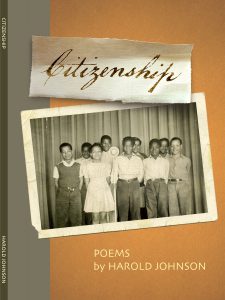 By Harold Johnson
By Harold Johnson
From the back cover:
Black history. African-American history. American history. Harold Johnson’s Citizenship embraces it all. Savvy, sassy, satiric, his work is so encompassing, so compassionate, his poems can sing for a whole nation. This collection’s last poem “Article Two” is a tour de force. In it, the voice of historical African-American experience speaks to Lincoln and ten earlier U.S. Presidents, holding them accountable for their roles in the curse of slavery, creating an indelible indictment of the “kleptocracy” in “Whitewashing ton d.c.” Praise and gratitude to Harold Johnson. We’re fortunate to have him “…talking writing trying to keep things/ from falling to pieces.”
—Paulann Peterson, Former Oregon Poet Laureate, author of The Voluptuary.
Harold Johnson’s Citizenship certainly has been long in coming, but that may be why the poems are so good. Right to the heart. And all that energy of our wild world. Just give me “Lunch Break” and “Public Housing” and I’m excited.
—Peter Sears, Former Oregon Poet Laureate, author of The Brink.
A wry and luminous sensibility tells us: This is your American story, and this, and this is America around you. History, in the broad view of time as well as the small moment, is apprehended in turns by whimsy, bemusement, and a daringly subtle, inevitable rage. There is here complicity in the rich mess of life, the ordinariness of death, the rare brilliance of love, and of course, baseball.
—Joanna Rose, novelist, poet, author of Little Miss Strange.
Harold Johnson’s Citizenship is a down-to-earth good read. These accomplished poems are built on hard-earned wisdom, rich with human situations every reader can recognize as his or her own. Johnson teaches us how to comprehend our lives through the close-up lens of everyday particulars and the long-view lens of global and historical concerns. He reminds us that we’ve been given the gift of citizenship in a diverse and miraculous world where, amidst tragedy and conflict, compassion triumphs. “Out of the heart of the neighborhood,” Johnson writes, “music from/ the Good Humor van rises, rolling this way.
—Lowell Jaeger, author of How Quickly What’s Passing Goes Past; editor of New Poets of the American West.